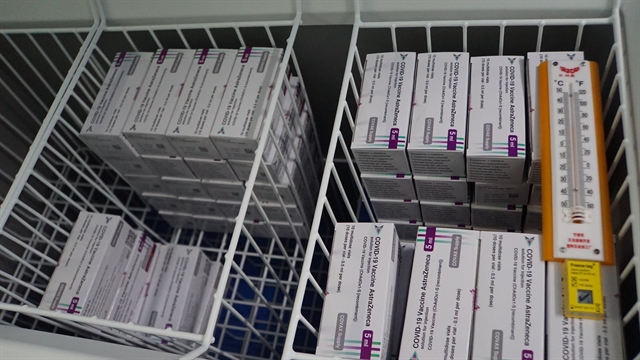 Society
Society


|
| A nurse prepares a COVID-19 vaccine at 109 Military Institute in the northern province of Vĩnh Phúc. — VNA/VNS Photo Hoàng Hùng |
HÀ NỘI — The health minister yesterday warned localities to use their COVAX-supplied COVID-19 vaccine doses by May 5 or face having them redistributed.
Minister of Health Nguyễn Thanh Long made the statement during a meeting with all provinces and cities in the country regarding COVID-19 control and vaccination efforts, urging them to finish vaccinating priority groups before the deadline or the remaining unused doses would go somewhere else.
Việt Nam on April 1 received the first batch of 811,200 doses of Oxford/AstraZeneca from the global vaccine sharing scheme COVAX Facility out of the planned 4.1 million-dose shipment by May.
Previously, the health ministry asked all localities to submit a list of all those eligible for vaccination and finish the inoculations by May 15, but the new deadline was moved up 10 days
The COVAX doses’ expiry date is said to be May 31, 2021.
Prime Minister Phạm Minh Chính in his first cabinet meeting on Thursday said the health ministry and localities cannot let any vaccine doses go to waste.
Regarding Việt Nam’s slow vaccine rollout, health experts noted the country has its own protocol – different from most nations – to ensure safety for the vaccinated as the COVID-19 vaccines have been approved for emergency use only.
All COVID-19 vaccination sites have to meet certain requirements in terms of facilities and staff, as well as carry out screenings and counselling before injection. All those who receive the jabs must remain at the site for at least 30 minutes for medical observation, monitor their condition at home in the following 24 hours and further monitoring is required for another three weeks.
Some 73,000 people – mostly frontline workers – have been inoculated against COVID-19, using, for the most part, the 110,000 doses bought from AstraZeneca that arrived in late February more than a month after the national drive was launched on March 8.
Eligible people for COVID-19 vaccine are those within the 10 priority groups detailed in the Government’s Decree 21, which are frontline workers (medical workers, COVID-19 steering committees, police and military forces directly involved in the fight against the pandemic); Vietnamese diplomats and relatives sent on overseas missions and diplomatic delegations and UN representative offices in Việt Nam; customs, exit and entry officers; essential service workers (utility, airlines, transport, tourism, etc.); teachers and education institution’s staff or those working at front-facing administrative offices; people with chronic diseases; the elderly (above 65 years old); people in COVID-19-hit outbreak areas; poor people and social welfare beneficiaries; people authorised by the State to work or study overseas.
Side effects
The National Expanded Programme on Immunisation has recorded 33 per cent of those vaccinated displaying typical post-injection reactions such as localised pain, itches, light fever, or fatigue that usually go away without medical intervention in one or two days.
The programme noted that the reactions in Việt Nam seem “much lower” than in other countries, adding that the rate of side effect reports among the vaccinated in its usual five-in-one vaccination for infants (diphtheria, tetanus, whooping cough, hepatitis B, and Haemophilus influenza type B) is about 50 per cent.
Only 0.1 per cent reported serious reactions, but they received timely interventions and could return to work after one or two days of treatment/follow-up observation at a medical facility.
No rare blood clotting incidents have been recorded among the vaccinated using AstraZeneca in Việt Nam so far.
The health ministry on Thursday issued a decision to set up a steering committee on safe vaccination, comprising leading experts in the field to provide support for localities in cases of vaccine incidents.
The ministry also appealed to the media to increase coverage of the benefits of vaccines to encourage more people to register for inoculation.
At the meeting, a representative from the WHO office in Việt Nam lauded the country's pandemic containment efforts, adding that vaccines are key to fighting COVID-19 and their benefits far outweigh their risks, but other prevention measures should still be maintained.

|
| Cold box containing AstraZeneca COVID-19 vaccines in a hospital in Cần Thơ City, southern Việt Nam. — VNA/VNS Photo |
Lessons learned
At Friday's meeting, health ministry officials and experts also agreed on six main lessons in dealing with the country’s third wave of infections, which has now been contained, so that localities could take note to avoid "stumbling missteps" in the face of possible new outbreaks.
Việt Nam has gone 22 days without new local infections, and life has mostly returned to normal.
First, centralised quarantine of probable COVID-19 cases and direct contacts of the infected – not self-isolation at home – is still the solution to prevent the spread of the virus in the community, as shown in the cases of Hải Dương Province during the last few months and Đà Nẵng in July-August last year, the epicentres of Việt Nam’s third and second waves.
Second, targeted lockdowns – with mass lockdowns still on the table in serious cases – and increased COVID-19 testing kept infections in check while impacts on socio-economic development were minimised.
Third, the involvement of police in contact tracing efforts in Hải Dương proved to be valuable and replicable.
Fourth, preparations and co-ordination between different agencies were needed to ramp up testing (including pooled testing) as fast as possible to contain the outbreaks.
Fifth, the quick establishment of field hospitals using existing facilities to treat COVID-19 patients was a must when cases exploded to ensure medical centres treating other diseases and conditions are not disrupted or overwhelmed.
Sixth, the deployment of central-level health officials to hotspots helped achieve better co-ordination with local authorities in delivering timely and appropriate responses.
At the meeting, health experts called for the continued strict management of borders to prevent risks of new outbreaks, especially given the many repatriation flights bringing citizens home and serious outbreaks in neighbouring countries.
“If our guard is down and imported cases cause infections in the community, especially the South African or the UK variant of the virus, then the containment would be very difficult,” Minister Long said. — VNS




